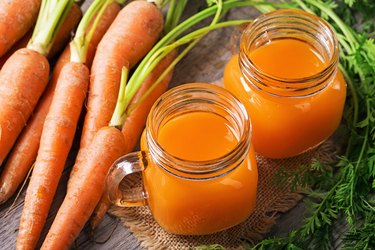
Supporters of juicing claim that it extracts all the most important nutrients from fruits and vegetables. Critics claim the potential side effects and dangers, such as having diarrhea after juicing, make it a diet fad to avoid.
Tip
Juicing may cause diarrhea and other unpleasant gastrointestinal side effects, especially if you are using fruits that contain large amounts of fructose to make your juices.
Video of the Day
Read more: 12 Health Trends That Are Not Healthy
Video of the Day
What Is Juicing?
Juicing is a process of extracting the juice from fruits and vegetables. In addition to the juice, you are getting many of the vitamins and minerals that the fruit or vegetables contain. But you are also stripping out other important nutrients, like fiber, and leaving in the sugar.
Many proponents of juicing talk about the supposed benefits of juicing. Benefits of juicing include:
- It can help cut calories.
- It is an excellent way to "detox."
- It is a great way to get extra nutrients.
If you struggle to get enough nutrients each day, juicing may be a good choice. But limited data supports the safety or effectiveness of juicing for a long period of time or for a detox. More research is also needed to fully understand exactly how effective the nutritional benefits are. You should be wary of any company making claims that sound too good to be true, because they probably are.
Read more: 9 Unhealthy, Even Dangerous Weight-Loss Diets
Stomach Pain After Juicing
Too much juicing can lead to stomach pain after juicing, diarrhea and other potential side effects such as constipation. According to the American Gastroenterological Association, fructose is a potential cause of diarrhea. Apples, pears, cherries and peaches all contain a large amount of fructose. If you're adding large amounts of these fruits to your juices, it could cause you to have diarrhea.
Juice also doesn't provide enough nutrients to sustain your body. A strict juice diet will mean you get limited protein, fat and other nutrients that your body needs.
According to the UCLA Center for East-West Medicine, the lack of protein and fiber combined with the high concentration of sugar in juices can cause you to feel hungry and tired and may cause a sugar crash. In addition, drinking too much juice can contribute to higher blood-sugar levels over time. For optimal health, skip juicing and eat whole, raw fruits and vegetables instead. Some healthy fruits and vegetables to eat include:
- Watermelon
- Kale
- Garlic
- Acai berries
- Blueberries
- Blackberries
- Carrots
- Avocado
- Broccoli
- Sweet potatoes
Dangers of Juicing
According to Harvard Health, juicing is not a great solution for weight loss. And since the body naturally detoxifies, you don't need it for that either. Harvard Health warns that you should avoid:
- A diet of strictly juicing
- Replacing a meal with juicing
- Detoxing with juicing
- Juicing to lose weight
If you're interested in using juicing as a detox, you might want to reconsider because detoxes and cleanses are unnecessary, a waste of money and potentially dangerous. In addition, the weight loss effects of low-calorie diets, like a detox, don't last, and you will likely regain any lost weight as you start to eat a regular diet again.
According to the U.S. Department of Health and Human Services, detoxing has many potential health risks including:
- You may experience the effects of low-blood sugar such as fatigue, headaches and hunger.
- If you consume prepackaged, unpasteurized juice, you run the risk of getting a food-borne illness.
- If you also use laxatives, it can lead to dehydration and electrolyte imbalance.
- If you have a kidney disorder, large amounts of juice may contain extra oxalate, an acid that can contribute to kidney stones and other issues.
Warning
Detoxing is a myth. Your body naturally detoxes using your kidneys and liver. Your intestines also detox using fiber and water to help remove waste and toxins. If you want to detox, you can help your intestines naturally by increasing your fiber and water intake each day.
- UCLA Center for East-West Medicine: "Juicing: Body Cleansing or Nutrient Depleting?"
- U.S. Department of Health and Human Services: "'Detoxes' and 'Cleanses'"
- Harvard Health Publishing: "Juicing -- Fad or Fab?"
- American Gastroenterological Association: "Fructose Malabsorption"
- Havard Health Publishing: "Is something in your diet causing diarrhea?"
Is this an emergency? If you are experiencing serious medical symptoms, please see the National Library of Medicine’s list of signs you need emergency medical attention or call 911.